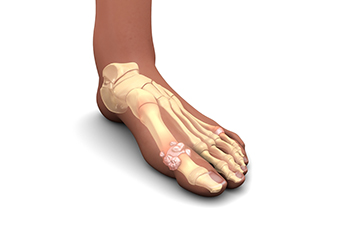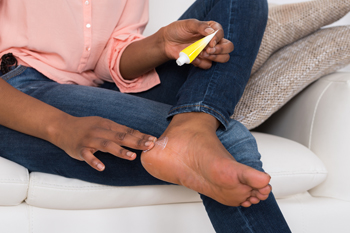
Preventing running injuries requires a combination of proper warm-up, focused training, and strength-building exercises. Starting each run with a warm-up is essential to prepare the muscles and joints for the physical demands of running. Dynamic stretches such as leg swings, high knees, and lunges help improve flexibility and activate key muscle groups. Running with purpose, by focusing on technique and form, is another critical step. This involves maintaining an upright posture, engaging the core, and avoiding overstriding to reduce unnecessary strain on the body. In addition to running, strength training exercises, such as calf raises, squats, and lunges, can help build stability and endurance. Incorporating drills like strides or short sprints at the end of easy runs can also improve speed and running efficiency. If you are suffering from foot or ankle pain from running, it is suggested that you consult a podiatrist who can offer you effective treatment and injury prevention techniques.
Exercising your feet regularly with the proper foot wear is a great way to prevent injuries. If you have any concerns about your feet, contact Howard Waxman, DPM of Pleasant Valley Podiatry. Our doctor will treat your foot and ankle needs.
How to Prevent Running Injuries
Many common running injuries are caused by overuse and overtraining. When the back of the kneecap starts wearing out and starts causing pain in your knee, this is commonly referred to as runner’s knee. Runner’s knee is a decrease in strength in your quadriceps and can occur if you’re not wearing properly fitted or supporting shoes. To prevent runner’s knee, focusing on hip strengthening is a good idea, as well as strengthening your quads to keep the kneecaps aligned.
What Are Some Causes of Running Injuries?
- One cause of a common running injury is called iliotibial band syndrome.
- Plantar fasciitis is also another common injury.
- Stress fractures can occur from overtraining, lack of calcium, or even your running style.
Best Ways to Prevent Running Injuries
- Wear footwear that fits properly and suits your running needs.
- Running shoes are the only protective gear that runners have to safeguard them from injury.
- Make a training schedule. Adding strengthening exercises as well as regular stretching can help keep you strong and limber and can lessen the possibility of injuries.
- Stretching keeps muscles limber; this will help you gain better flexibility.
If you have any questions please feel free to contact one of our offices located in Willoughby Hills and Broadview Heights, OH . We offer the newest diagnostic and treatment technologies for all your foot and ankle needs.

Gout is a type of arthritis that results from the buildup of uric acid crystals in the joints, and while it is more commonly associated with adults, it can also occur in children. This condition can lead to sudden and intense episodes of pain, swelling, and redness in the affected joints, often starting in the big toe but potentially affecting other areas as well. Symptoms may include persistent joint discomfort, difficulty moving the affected joint, and inflammation that can last for days or weeks. In some cases, children may experience fever alongside these symptoms. Identifying gout in children is important for timely treatment and management, which often involves dietary changes and medication to control uric acid levels. If your child has symptoms of gout, it is strongly suggested that you consult a podiatrist who can offer effective relief and management strategies.
Gout is a painful condition that can be treated. If you are seeking treatment, contact Howard Waxman, DPM from Pleasant Valley Podiatry. Our doctor will treat your foot and ankle needs.
What Is Gout?
Gout is a form of arthritis that is characterized by sudden, severe attacks of pain, redness, and tenderness in the joints. The condition usually affects the joint at the base of the big toe. A gout attack can occur at any random time, such as the middle of the night while you are asleep.
Symptoms
Risk Factors
Prior to visiting your podiatrist to receive treatment for gout, there are a few things you should do beforehand. If you have gout you should write down your symptoms--including when they started and how often you experience them, important medical information you may have, and any questions you may have. Writing down these three things will help your podiatrist in assessing your specific situation so that he or she may provide the best route of treatment for you.
If you have any questions, please feel free to contact one of our offices located in Willoughby Hills and Broadview Heights, OH . We offer the newest diagnostic and treatment technologies for all your foot care needs.

Cracked heels are a common issue that can lead to discomfort, pain, and in severe cases, infection. Cracked heels develop when thickened skin on the heels, called calluses, becomes dry and splits open due to pressure from walking or standing. This is particularly common in people with diabetes or circulation issues, like peripheral artery disease. Callused skin first develops as a protective response to friction and pressure, but it can crack if it becomes too dry. The subsequent heel fissures can cause discomfort, make walking difficult and increase the chances of infection. A podiatrist can help by carefully debriding thickened calluses to reduce pressure and advising on proper foot care and moisturizing techniques. This foot doctor can also determine if you have any underlying issues that may need medical attention. Such a proactive approach can help reduce the risk of complications and promote foot health. If you have problematic cracked heels, it is suggested that you schedule an appointment with a podiatrist for an exam and treatment.
If the skin on your feet starts to crack, you may want to see a podiatrist to find treatment. If you have any concerns, contact Howard Waxman, DPM from Pleasant Valley Podiatry. Our doctor can provide the care you need to keep you pain-free and on your feet.
Cracked Heels
It is important to moisturize your cracked heels in order to prevent pain, bleeding, and infection. The reason cracked heels form is because the skin on the foot is too dry to support the immense pressure placed on them. When the foot expands, the dry skin on the foot begins to split.
Ways to Help Heal Them
Ways to Prevent Cracked Heels
If you are unsure how to proceed in treating cracked heels, seek guidance from a podiatrist. Your doctor will help you with any questions or information you may need.
If you have any questions, please feel free to contact one of our offices located in Willoughby Hills and Broadview Heights, OH . We offer the newest diagnostic and treatment technologies for all your foot care needs.

Kidney disease can lead to significant foot problems as a result of damage to the nerves and blood vessels in your lower limbs. As kidney function declines, circulation to the feet may decrease, and you may lose sensation in your feet, which makes it hard to detect injuries or infections. Reduced circulation also means wounds heal more slowly. This increases the risk of foot ulcers, which can lead to serious complications, including infections and in severe cases loss of limb. Other common problems include hard skin buildup, changes in foot shape, and a higher risk of developing blisters or sores. People undergoing dialysis or with advanced kidney disease are at even greater risk. A podiatrist plays a vital role in managing risks caused by kidney disease by performing regular foot assessments, recommending appropriate footwear, and treating skin and nail issues. They help create an ongoing care plan that can reduce the likelihood of further complications. If you have foot problems as a result of kidney disease, it is suggested that you schedule an appointment with a podiatrist for an evaluation and treatment.
When dealing with systemic disease of the feet, it is extremely important to check the affected areas routinely so that any additional problems are caught quickly. If you have any concerns about your feet and ankles contact Howard Waxman, DPM from Pleasant Valley Podiatry. Our doctor will assist you with all of your podiatric needs.
Systemic Diseases of the Feet
Systemic diseases affect the whole body, and symptoms usually are displayed in the feet. This condition can make a patient’s ability to walk unbearable. Systemic diseases include gout, diabetes mellitus, neurological disorders, and arthritis.
Gout – is caused by an excess of uric acid in the body. Common symptoms include pain, inflammation, and redness at the metatarsal/phalangeal joint of the base big toe. Gout can be treated by NSAIDs to relieve pain and inflammation, and other drugs that lower the acid levels in the body.
Diabetes mellitus – is an increase in the level of blood sugar that the body cannot counteract with its own insulin. Failure to produce enough insulin is a factor in Diabetes.
Diabetes of the Feet
Diabetic Neuropathy – may lead to damaged nerves and affect the feet through numbness and loss of sensation.
Peripheral Vascular Disease – can restrict the blood flow to the feet, and often times lead to amputation of the feet.
If you have any questions please feel free to contact one of our offices located in Willoughby Hills and Broadview Heights, OH . We offer the newest diagnostic and treatment technologies for all your foot and ankle needs.